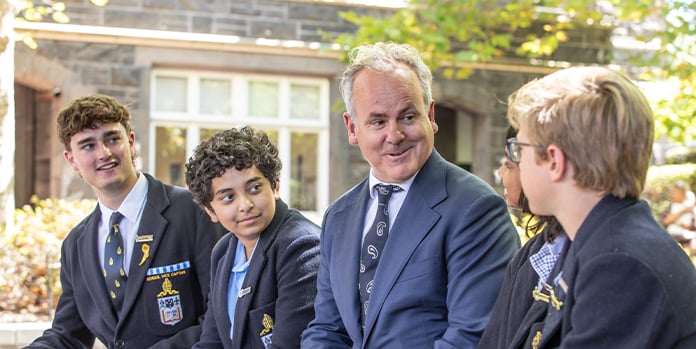What does leadership mean for students at Melbourne Grammar School? In attempting to answer this question, what comes to my mind is the advice of Dr Martin Luther King Jr, who told us: “Life’s most persistent, urgent question is, ‘What are you doing for others?’”
Inherent in this idea is the belief that anyone can lead because anyone can serve, and I think this sums up the way we understand student leadership across our campuses.
Of course, not every student takes on a formal leadership position, but it is no less important to instil leadership characteristics in students who do not take on these roles. Our aim is to develop young people who are collaborative, certain about their own values, and able to use those values to guide their decision-making. Any student can be invited to develop these skills.
Leadership involves respect and inclusion
In some ways, the approach to leadership at Melbourne Grammar is almost the opposite to the traditional view. Here, we value leaders who can move towards a goal by bringing others on the journey, rather than simply dictating what must happen next. We believe that the capacity to ensure multiple viewpoints are heard, listened to, and respected will always result in a better outcome.
Importantly, this style of leadership involves encouraging others to hold and consider alternative and differing views. This is particularly important today when many issues are polarised in our wider community, and there’s little room for healthy, respectful disagreement. The ability to engage in the “messy middle” is vital.
What is fascinating to see is how quickly other students pick up on their need for a leader to be authentic in their role, along with having an ability to work on behalf of everyone around them—not just the students in their immediate circle. From an early age, students have a strong understanding that leaders need to act in the interests of all members of a group.
Everyone learns to lead
Instilling these skills means we have to start talking about leadership with our youngest students. Of course, the guidance and level of responsibility we give to our students is age-appropriate, and changes as they mature. Even within a given year, a student’s understanding of leadership may change. This reflects an approach we refer to as the “spiral curriculum” where simple ideas are introduced in earlier years, and are returned to time and time again increasing in sophistication as our students progress through the School.
At Grimwade House, we prompt students to begin exploring how they could use their strengths to work with others. At Wadhurst, emerging adolescents are encouraged to collaborate with their peers and work toward a goal that benefits the wider community. At Senior School, as students move towards adulthood, they are given opportunities to understand the broader responsibilities and obligations that come with being a leader.
Whether students take up a formal leadership position or lead others in a more informal way, ultimately, we want our students to understand who they are—as leaders, and as people. With this knowledge, they will be equipped to tackle whatever difficulties they might encounter, and be able to serve and lead their communities from a confident, positive place.
Ben Hanisch
Deputy Headmaster and Head of Senior School



